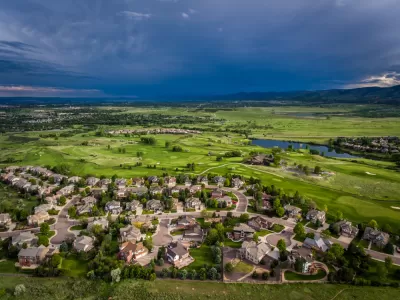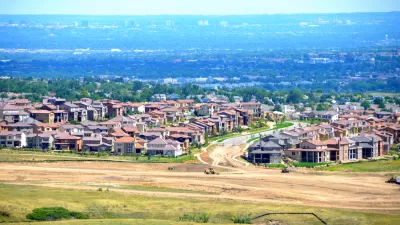Residents of the city of Lakewood have approved a ballot measure that caps annual residential development and requires City Council approval of all developments over 40 units.

"Voters in Colorado’s fifth-largest city on Tuesday approved a cap on residential construction that will be among the strictest in the metro area," reports John Aguilar.
Voters approved Question 200 with 53 percent of the vote, thus capping "the construction of new homes and apartments each year to no more than 1 percent of the existing housing stock in the city and would require City Council approval of large development proposals," according to Aguilar. According to Question 200, the "City Council must give explicit approval to any project that has at least 40 units."
Question 200 had a long route to the ballot box, clearing multiple legal hurdles before appearing before voters. The public approved the law despite most of the money spent on the campaign was devoted to defeating the measure.
Lakewood Mayor Adam Paul opposed Question 200, but most of the soundbites in the article are sourced from residents celebrating a victory.
Also voicing support for the vote, an opinion piece written a few days after voters approved Question 200 makes the case that the slow growth measures implemented by Question 200 will equal an effective climate action plan. Gary Wockner, the author of the opinion piece, hinges the argument on this paragraph:
Simple back-of-the-envelope math tells you that if you have less human consumers, you will have less population-caused GHG emissions. By slowing population growth, Lakewood will slow its GHG emissions — every city in Colorado could do the same thing, as could the state.
Wockner's argument in support of slow growth as a climate change mitigation measures has been directly refuted in the past.
FULL STORY: Lakewood voters pump brakes on home building, pass slow-growth initiative in special election

Maui's Vacation Rental Debate Turns Ugly
Verbal attacks, misinformation campaigns and fistfights plague a high-stakes debate to convert thousands of vacation rentals into long-term housing.

Planetizen Federal Action Tracker
A weekly monitor of how Trump’s orders and actions are impacting planners and planning in America.

Chicago’s Ghost Rails
Just beneath the surface of the modern city lie the remnants of its expansive early 20th-century streetcar system.

Bend, Oregon Zoning Reforms Prioritize Small-Scale Housing
The city altered its zoning code to allow multi-family housing and eliminated parking mandates citywide.

Amtrak Cutting Jobs, Funding to High-Speed Rail
The agency plans to cut 10 percent of its workforce and has confirmed it will not fund new high-speed rail projects.

LA Denies Basic Services to Unhoused Residents
The city has repeatedly failed to respond to requests for trash pickup at encampment sites, and eliminated a program that provided mobile showers and toilets.
Urban Design for Planners 1: Software Tools
This six-course series explores essential urban design concepts using open source software and equips planners with the tools they need to participate fully in the urban design process.
Planning for Universal Design
Learn the tools for implementing Universal Design in planning regulations.
planning NEXT
Appalachian Highlands Housing Partners
Mpact (founded as Rail~Volution)
City of Camden Redevelopment Agency
City of Astoria
City of Portland
City of Laramie





























